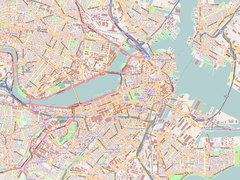| John Coburn House | |
|---|---|
 | |
| General information | |
| Location | Beacon Hill |
| Address | Private residence: 2 Phillips Street |
| Town or city | Boston |
| Country | United States |
| Coordinates | 42°21′37″N 71°03′59″W / 42.360337°N 71.066381°W |
The John Coburn House was the home of John P. Coburn (1811–1873), an African-American abolitionist who aided people on the Underground Railroad. The home is currently a private residence. It is on the Black Heritage Trail and its history is included in walking tours by the Boston African American National Historic Site.
Between 1843 and 1844, Coburn commissioned architect Asher Benjamin to design a house for him at the corner of Phillips and Irving Streets. Coburn lived there with his wife, Emmeline, and their adopted son Wendell.[1][2]
Black Heritage Trail
[edit]The house is a Boston African-American historical site located on the Black Heritage Trail in Beacon Hill.[3][4][5][6]
The National Park Services wrote:
The historic buildings along today's Black Heritage Trail® were the homes, businesses, schools and churches of a thriving black community that organized, from the nation's earliest years, to sustain those who faced local discrimination and national slavery, struggling toward the equality and freedom promised in America's documents of national liberty.[6]

References
[edit]- ^ Petronella, Mary Melvin (2004). Victorian Boston Today: Twelve Walking Tours. UPNE. p. 137. ISBN 9781555536053.
- ^ Curtis, Nancy C. (1996). Black Heritage Sites: An African American Odyssey and Finder's Guide. American Library Association. p. 295. ISBN 9780838906439.
- ^ "Boston African American NHS Park Brochure, Side 2" (PDF). National Park Service.
- ^ Fodor's (December 16, 2008). The Official Guide to America's National Parks, 13th Edition. Fodor's Travel Publications. pp. 441–. ISBN 978-1-4000-1628-0. Retrieved April 26, 2013.
- ^ David L. Scott; Kay W. Scott (2004). Guide to the National Park Areas, Eastern States. Globe Pequot Press. pp. 110–112. ISBN 9780762729883. Retrieved April 26, 2013.
{{cite book}}:|work=ignored (help) - ^ a b "Boston African American NHS Park Brochure, Side 1" (PDF). National Park Service. Retrieved April 26, 2013.
 This article incorporates public domain material from websites or documents of the National Park Service.
This article incorporates public domain material from websites or documents of the National Park Service.
